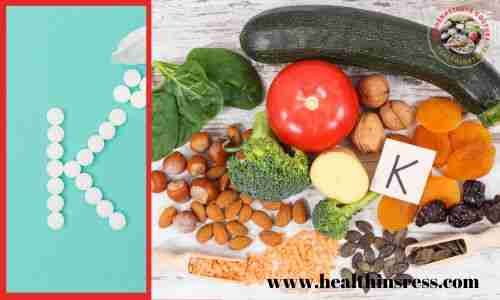Today, I’m super excited to talk about the power of vitamin K2.Your guide to better health
If you haven’t heard about this mighty nutrient before, don’t worry, you’re not alone! Vitamin K2 often flies under the radar, but it plays a vital role in keeping our bodies in top-notch condition.
What is Vitamin K?
Let’s start at the beginning. Vitamin K was discovered in 1929 as a crucial nutrient for blood clotting.

In fact, its initial name, “Koagulationsvitamin,” gave rise to the “K” in vitamin K.
There are two main forms of this powerhouse vitamin:
K1, found in plant foods like leafy greens,
and K2, found in animal-based and fermented foods, with a little help from our gut bacteria.
How Vitamins K1 and K2 Work
Now, let’s talk about how these vitamins work their magic in our bodies.
Vitamin K is like the conductor of an orchestra, activating proteins that play crucial roles in blood clotting, calcium metabolism, and heart health.
One of its most important functions is regulating calcium deposition, promoting the calcification of bones while preventing it in blood vessels and kidneys.
Vitamin K2 and Heart Health
Heart disease is a major concern, and this vitamin may be a secret weapon against it.
By reducing calcium buildup in the arteries, this superhero nutrient helps lower the risk of heart disease.
Some studies have even shown a positive correlation between vitamin K2 intake and a reduced risk of coronary heart disease. Keep in mind that more research is needed, but the evidence is compelling!
Boosting Bone Health and Fighting Osteoporosis
The battle against osteoporosis is real, especially among older women.
this vitamin steps in to activate proteins that build and maintain strong bones.
Studies have shown that vitamin K2 supplements can improve bone mineralization and increase bone strength in postmenopausal women. In Japan, vitamin K supplements are officially recommended for preventing and treating osteoporosis.
Vitamin K2: A Dental Health Ally?
Believe it or not, this vitamin might have some cool benefits for your pearly whites too! Some studies suggest that regular vitamin K supplementation, along with moderate fiber intake, could help prevent tooth loss from gum disease.
Though more research is needed, it’s reasonable to think that this superhero nutrient could play a role in dental health as well.
RELATED BLOG POST
Vitamin K2 and Cancer Prevention
Cancer is a formidable foe, but this has shown promise in the fight against it. Studies have indicated that this vitamin may reduce the recurrence of liver cancer and increase survival times.
However, it’s essential to note that some research has linked high intakes of MK (a subtype of vitamin K2) with an increased risk of breast cancer.
More studies are needed in this area to fully understand its implications.
Unlocking the Sources of Vitamin K2
Getting enough of this vitamin in our diet is essential, but it can be a bit challenging. this vitamin is mainly found in animal and fermented foods, such as high-fat dairy products from grass-fed cows, egg yolks, liver, sauerkraut, natto, and miso.
For those who don’t consume these foods regularly, supplements are a viable alternative, but it’s best to consult a healthcare provider before adding them to your diet.
The Bottom Line: Harnessing the Power of Vitamin K2
In conclusion, vitamin K is a group of nutrients that includes both K1 and K2.
While K1 plays a vital role in blood coagulation, vitamin K2 takes the spotlight when it comes to heart and bone health.

Researchers are increasingly exploring the potential benefits of these vitamin supplements, especially for those at risk of heart disease.
As always, more studies are needed to fully solidify these recommendations.
this vitamin plays an essential role in keeping our bodies in tip-top shape!
From boosting heart health, strengthening bones, to supporting dental health, this powerful nutrient is a true health hero.
Remember, it’s crucial to maintain a balanced diet that includes vitamin K1 and K2 sources to unlock the full potential of these incredible vitamins.
Have you heard of vitamin K2?
Or are you taking it as a supplement?
Drop your comments below.And don’t forget to follow me on Pinterest for more health tips.






